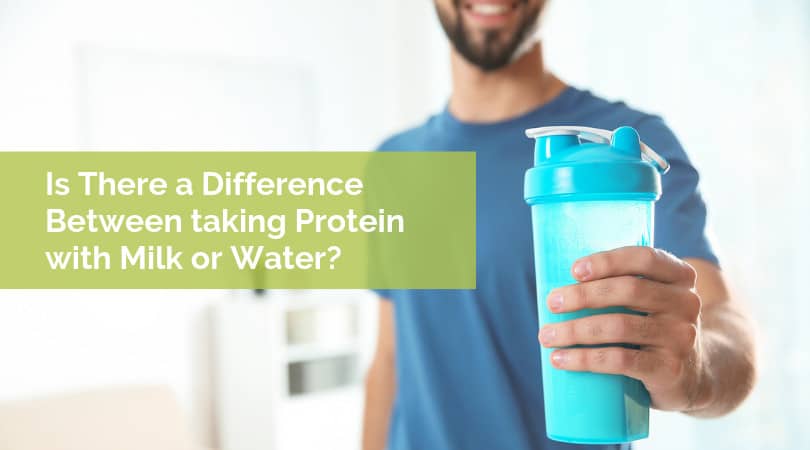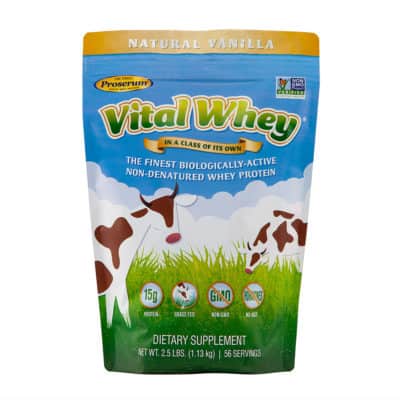
Recommended Products
Whether you’re a serious athlete, a bodybuilder or simply an average Joe looking to lose some weight and gain muscle, introducing more protein into your diet can help you achieve your goals.
While protein can be found naturally in many foods like meat, eggs, beans, soy foods, nuts, seeds, and cheese, protein powders are a convenient, quick and tasty way to get more protein into your diet.
But when it comes to how you prepare your protein shake, there is some debate as to whether it’s better to make your protein shake with water or milk. Some people wonder if they should be thinking about nutrient composition, whether the mixing liquid will impact muscle mass and recovery, and of course if one-way tastes better than the other.
Ultimately, the decision you make about whether to make your protein shake with water or milk will all depend on your own personal goals and preferences.
Factors to Consider When Deciding to Mix Your Protein Powder with Milk or Water
Protein shakes are widely used by people for reasons ranging from exercise recovery, to muscle and weight gain, to simply being a way to add concentrated nutrients to their lifestyle. In order for your protein shake to provide the benefits you’re seeking, it’s important to make sure you’re making it work for you and not against your goals. How do you do this? Consider the factors below when deciding the best way to prepare and consume your protein shake.
Do Calories Matter?
One of the main differences between making a protein shake with water or milk is the calories. A cup (8 ounces or 240 ml) of low-fat milk has approximately 100-120 calories, whereas a cup of water has zero calories. Obviously, the protein powder will also have calories, which need to be accounted for in your shake as well as any other ingredients you might add. How many calories your protein powder will have depends on a number of factors, such as the protein source, other ingredients, and flavor.
If your main goal is to cut calories or lose weight, mixing protein powder with water as opposed to milk is the way to go. It can be an effortless way to cut calories, allowing you to add other tasty ingredients to your shake that may also contribute other nutrients.
On the other hand, if you need to beef up your calories or want to gain weight, you may want to mix your protein with a high-fat, high-calorie milk. Using whole milk would provide the most calories and could help with weight gain by being a concentrated source of energy. One cup (240 ml) of whole milk will add an extra 150-180 calories to your protein shake.
Milk Increases Your Protein
How much protein you need in your diet is another factor in determining if you should mix your whey protein powder with milk or water. Protein is an essential nutrient for everyone, and can have specific benefits to your body when you’re working out. For instance, protein helps repair and build muscle that is broken down during a workout. Protein also provides 4 calories per gram, contributing a secondary nutritional benefit.
While there is already a good dose of protein in whey, a dairy milk protein, choosing to blend your protein with milk will boost your protein even further, as milk is a great source of protein. If you want to mix your protein powder with a non-dairy milk, choosing soy milk or pea milk will provide the protein content most similar to dairy milk.
Dairy, soy, and pea milk contain around 8 grams of protein per cup. Other non-dairy milks tend to be low in protein and should not be relied upon for this nutrient. Whatever type of milk you choose, be sure to read the nutrition facts panel to make sure it meets your nutrient needs.
If you are concerned about getting enough protein in your diet, drinking your whey protein shake with milk may be a great option. A protein shake made with Vital Whey and milk could add 24 grams of high quality protein to your diet. That is the equivalent of eating about 4 ounces of meat, in just one tasty drink.
Milk Has Carbohydrates
Once again, whether you choose to mix your protein shake with water or milk will all depend on your desired results. Milk contains carbohydrates, in the form of lactose or milk sugar.
Carbohydrates are important because they are the main source of dietary energy for your body, broken down into glucose. One cup (240 ml) of milk has about 12 grams of carbohydrates. If you are trying to cut down on your carbohydrates, mixing whey protein with water will be the obvious choice for you.
Of course, on the flip side, carbohydrates provide your body with needed energy as mentioned. After a workout, your carbohydrate stores are depleted and should be replenished, along with protein of course. Consuming carbohydrates along with protein after a workout can help with faster muscle recovery. Therefore, if you are planning on drinking your protein shake after a workout, it may be better to mix your whey protein with milk.
What About Fat?
Milk can be high in fat, depending on the type you choose. Here is a breakdown of the fat content of milk:
Whole milk: 8 grams of fat per cup
Reduced fat or 2% milk: 5 grams of fat per cup
Low Fat or 1% milk: 3 grams of fat per cup
Fat free or skim milk: 0 grams of fat per cup
Most of the fat found in milk is saturated fat, which may raise bad cholesterol levels. If you are trying to reduce your fat intake, mixing protein powder with water or nonfat milk is the best option.
If you choose a non-dairy milk these will typically be lower in fat content, but will not contain saturated fat unless it’s coconut milk. Furthermore, plant-based milks will provide some unsaturated fats that may have other health benefits.
Muscle Recovery
Another benefit of mixing protein with milk rather than water involves the rate of muscle recovery. In other words, how quickly your muscle fibers heal and come back together stronger after being damaged by a workout. Dairy milk is made up of a blend of liquid whey and casein protein; this combination of whey and casein helps muscles recover faster after a tough workout.
When muscles recover faster, this allows you to get back to the gym sooner, so you can continue to work on your goals.
Milk Builds Muscle
If you are looking to build significant muscle, opt for mixing whey protein with milk. Milk is composed of 20 percent liquid whey and 80 percent casein, both of which are high-quality proteins that contain all nine essential amino acids. Muscles need quality, easy to digest protein to grow. Milk can provide the right kind of protein to help rebuild muscle after your strength conditioning workouts and help you get stronger.
A 2007 study compared the consumption of milk or a soy-based drink on muscle growth after exercise. Fifty-six subjects weight trained five days a week for 12 weeks. They consumed one of three drinks after exercise: milk, soy protein, or a milk/soy combination drink that acted as a placebo.
Muscle fiber size, body composition, and maximum strength was measured before and after the 12 weeks. Of the subjects that consumed the milk, they experienced a significant increase in the number of muscle fibers and improved body composition compared to the other groups.
Food Intolerances and Allergies
Some people are allergic to milk or are lactose intolerant, meaning they cannot digest the sugar in milk due to a lack of the enzyme lactase. If it is a true milk allergy, you shouldn’t consume whey protein at all.
Be sure your protein powder doesn’t contain any milk proteins, or has the potential to contain traces of milk protein that could be problematic in this case. However, for the lactose-sensitive, a reduced lactose or lactose-free whey protein could still work for your needs. Otherwise, the safest bet would be an alternative, non-dairy, protein powder.
Non-dairy protein powders are naturally free from casein and whey, as these are dairy proteins. They’re also free of lactose, which is solely found in dairy products.
Taste
Sometimes you can be so focused on the health benefits of a particular food that you can forget about taste. Taste matters! After all, you’re much more likely to drink a protein shake if you enjoy the taste of it.
Mixing your whey protein with milk will usually taste a lot richer and creamier than if you simply blend it with water. Milk adds a smooth flavor to the shake, which you may not get with just water alone. Water can also result in a thinner, more liquid consistency that you may not enjoy as much.
Even more, the added carbs, protein and calories from the milk can help you feel fuller longer which can help with hunger cravings. The better and more satisfying you make your protein shake, the more likely you are to drink it regularly.
Whether you choose to mix your whey protein shake with water or milk depends greatly on the reason you are taking the protein. To sum it up, if you need to limit your calories, carbohydrates, and/or fats, then mix your whey protein with water.
If you are aiming to build muscle, boost post-workout recovery, or satiety, choose to mix your whey protein with milk. And of course, don’t forget to factor in taste preferences to make using a protein shake a sustainable habit to support your desired exercise goals.
For more about Well Wisdom’s own whey protein products, click HERE!
- Persistent Tiredness and Chronic Fatigue: Causes and Symptoms - February 27, 2024
- Can A Protein Shake Replace A Breakfast Meal? - March 2, 2023
- Glutamine After Surgery: Does It Help With Recovery? - February 17, 2023






I want to get more and more muscles… How to use protein powder in milk or water???
I want to use almond milk unsweetened and protein powder unsweetened and some frozen fruit is this ok because I’m a diabetic I
You know all the stuff that was written under the big letters MILK BUILDS MUSCLE .. HINT: answer is MILK builds muscle.. NOT water.. WATER does NOT build muscle..
What should I eat after and before workout. Plss help
Food
Thanks. Very useful
Carbs before workout and carbs+protein after
Is whole milk ok to use instead of skim milk?
Hello Sharyl,
Any form of liquid milk or milk-alternative is fine to mix with our whey. The main goal is to avoid highly acidic juices and/or heated liquids.
We hope this helps.
-The Well Wisdom Team